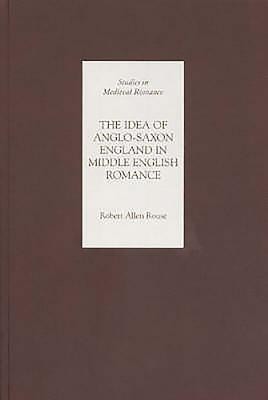
- We will send in 10–14 business days.
- Author: Robert Rouse
- Publisher: Boydell & Brewer
- ISBN-10: 1843840413
- ISBN-13: 9781843840411
- Format: 16.4 x 23.8 x 2.1 cm, hardcover
- Language: English
- SAVE -10% with code: EXTRA
The Idea of Anglo-Saxon England in Middle English Romance (e-book) (used book) | bookbook.eu
Reviews
Description
Investigation into the importance of the Anglo-Saxon past in medieval literature.
As the point of origin, both real and imagined, of English law and group identity, the Anglo-Saxon past was important in the construction of a post-Conquest English society that was both aware of, and placed great stock in, its Anglo-Saxon heritage; yet its depiction in post-Conquest literature has been very little studied. This book examines a wide range of sources (legal and historiographical as well as literary) in order to reveal a "social construction" of Anglo-Saxon England that held a significant place in the literary and cultural imagination of the post-Conquest English. Using a variety of texts, but the Matter of England romances in particular, the author argues that theyshow a continued interest in the Anglo-Saxon past, from the localised East Sussex legend of King Alfred that underlies the twelfth-century Proverbs of Alfred, to the institutional interest in the Guy of Warwick narrative exhibited by the community of St. Swithun's Priory in Winchester during the fifteenth century; they are part of a continued cultural remembrance that encompasses chronicles, folk memories, and literature. Dr ROBERT ALLLEN ROUSE teaches in the Department of English, University of British Columbia.EXTRA 10 % discount with code: EXTRA
The promotion ends in 18d.20:03:32
The discount code is valid when purchasing from 10 €. Discounts do not stack.
- Author: Robert Rouse
- Publisher: Boydell & Brewer
- ISBN-10: 1843840413
- ISBN-13: 9781843840411
- Format: 16.4 x 23.8 x 2.1 cm, hardcover
- Language: English English
Investigation into the importance of the Anglo-Saxon past in medieval literature.
As the point of origin, both real and imagined, of English law and group identity, the Anglo-Saxon past was important in the construction of a post-Conquest English society that was both aware of, and placed great stock in, its Anglo-Saxon heritage; yet its depiction in post-Conquest literature has been very little studied. This book examines a wide range of sources (legal and historiographical as well as literary) in order to reveal a "social construction" of Anglo-Saxon England that held a significant place in the literary and cultural imagination of the post-Conquest English. Using a variety of texts, but the Matter of England romances in particular, the author argues that theyshow a continued interest in the Anglo-Saxon past, from the localised East Sussex legend of King Alfred that underlies the twelfth-century Proverbs of Alfred, to the institutional interest in the Guy of Warwick narrative exhibited by the community of St. Swithun's Priory in Winchester during the fifteenth century; they are part of a continued cultural remembrance that encompasses chronicles, folk memories, and literature. Dr ROBERT ALLLEN ROUSE teaches in the Department of English, University of British Columbia.

Reviews